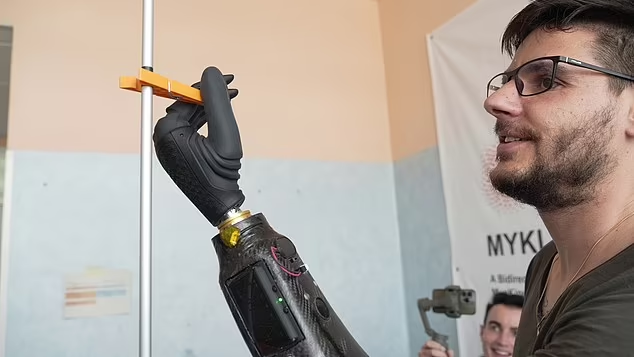A man who lost his left hand is now able to open jars, close a zip and use a screwdriver easily, thanks to a world-first magnetically controlled prosthetic hand.
By Rebecca Whittaker For Mailonline
The first-of-it’s-kind bionic limb uses tiny implanted magnets in the forearm, which respond to the amputee’s brain signals, to allow them to finely control the movements of a prosthetic.
An Italian research from the BioRobotics Institute developed the robotic hand that converts signals from six magnets implanted in the remaining arm to generate fine dexterous movements.
The bionic hand was take for a successful tested drive by 34-year-old Daniel who used the prosthesis for six weeks and described it ‘like moving my own hand’.
It works by placing magnets, measuring a few millimetres in size, in muscles in the forearm that previously helped control the now- severed hand.
By moving theses muscles, an amputee like Daniel can send magnetic signals to a special computer program that translates them to precise movements of the robotic hand.
This allows him to perform fine movements similar to that of a flesh-and-blood equivalent.
‘There are 20 muscles in the forearm and many of them control the hand movements,’ said Professor Christian Cipriani, at the BioRobotics Institute of the Scuola Superiore Sant’Anna.
‘Many people who have lost a hand keep on feeling it as if it is still in place and the residual muscles move in response to the commands from the brain.’
Daniel, who lost his left hand in 2022, was selected as a volunteer for the study because he still felt the presence of his hand.
Residual muscles in his arm continued to respond to his brain signals.
In April 2023, he underwent surgery to implant six magnets in his arm.
For each one, the team of surgeons located and isolated the specific muscle they wanted the magnet to respond to and then mapped this pattern with the computer program.
The results of the experiment went far beyond the most optimistic expectations.


No comments:
Post a Comment